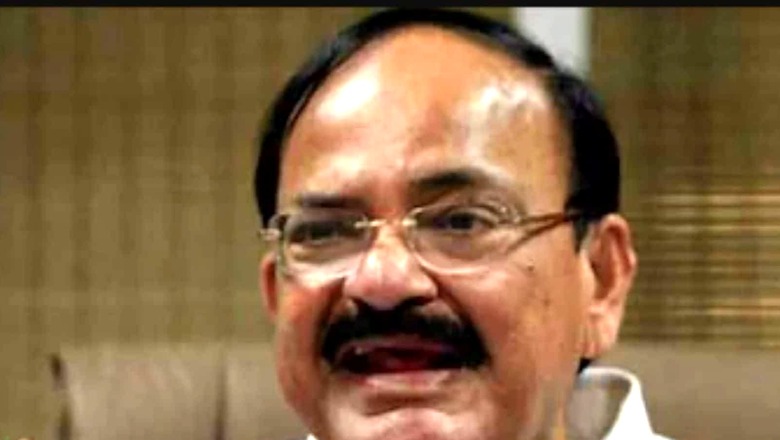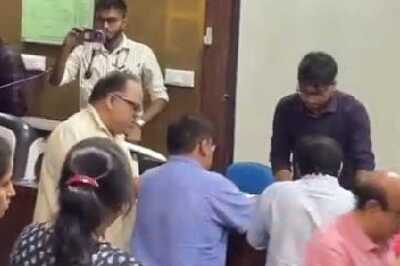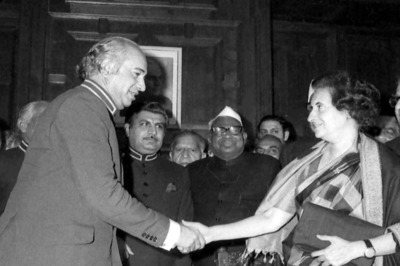
views
Disruptions resulting in forced adjournments of the House lead to derailment of business, deprive members willing to participate in proceedings and delay the course of law making, Vice President and Rajya Sabha Chairman M Venkaiah Naidu said on Saturday. He also said that the financial implications of rendering the legislatures dysfunctional through disruptions, the socio-economic impacts of delayed legislation and defective legislation are quite substantial.
Legislatures are to function on behalf of the people and for the people, and they are supposed to be productive and not disruptive, Naidu said while addressing the second Ram Jethmalani Memorial Lecture. The Rajya Sabha chairman said that people often ask him why does he adjourn the House amid ruckus, and he says that he does not want people to witness ugly scenes. But there is another view to it that people should watch disruptions, Naidu said, adding that he is now having a rethink.
He, however, did not elaborate. Naidu noted that the 14-point Framework of Code of Conduct recommended by the Ethics Committee of Rajya Sabha and adopted by the House requires that members must not do anything that brings disrepute to the Parliament and affects its credibility. "The question is whether disruptions enhance the reputation of the Parliament? Certainly not," Naidu said. The Rajya Sabha chairman said the privilege of freedom of speech of legislators during proceedings is the most talked about one and often perceived "negatively". "I would like to stress that it is not an unfettered right and it is qualified," he noted.
Speaking on the occasion, Law Minister Kiren Rijiju said when disruptors become the new newsmakers, it is not good news. He said he was also of the view that with privileges come responsibilities. Solicitor General Tushar Mehta said one sees brilliance of parliamentarians when there are no disruptions. He also said that disruptions in Parliament have resulted in people getting disillusioned from this institution itself and that to his mind is the biggest threat to democracy.
Mehta made it amply clear that these are not the views of the government or the office he holds, but his personal views. Disruption in and outside Parliament is something which a common man neither accepts or expects, he noted.
Quoting Rijiju, Union Women and Child Development Minister Smriti Irani said disruptions and antics, and not oratory have become the norm. She said that besides disruptions, the Monsoon Session of Parliament also saw some "physical activities" which brought disrespect to Rajya Sabha.
The voice of the people rising with anticipation of building a stronger nation was suppressed by some opposition parties, Irani said. She said those who could not win through ballot now use disruptions as an instrument.
Mahua Moitra of the TMC said protest and dissent are absolutely essential facets of a genuine democracy. She said would Ram Jethmalani be described as an anti-national for speaking up for migrant labourers. The second-highest law officer, she said, swore in open court that there were no migrants on the street. "Who would be anti-national, ask yourself," Moitra said.
She also referred to a move of a breach of privilege motion against her for raising an issue in Lok Sabha regarding a former member of the judiciary. The TMC leader said the right to be heard was denied in Parliament on the three agri laws which were against the federal structure and were against interests of millions of farmers.
The demand of the opposition for a rightful debate cannot be dubbed as disruption, she said. Moitra said that the opposition would have failed in its duty had it not sought a proper reply from the government on the Pegasus spying row.
Earlier, Naidu said during 1978-1996, the productivity of the Upper House of Parliament had been more than 100 per cent. The average annual productivity of the House, measured in term of effective utilisation of available time has been 100 per cent or more for 16 of those 19 years, he noted. However, the scenario began to change thereafter, Naidu said. During the 24 years between 1997 and 2020, the productivity of the House clocked 100 per cent or more only in two years in 1998 and 2009, he said. This is the area of concern which brings out the consequences of rising disruptions, he pointed out. The overall productivity of Rajya Sabha during 2004-2014 has been about 78 per cent and since then it has come down to about 65 per cent, Naidu noted. "The productivity of the last 11 sessions that I have had the honour of presiding over comes to 66.50 per cent. Four of these 11 sessions clocked low productivity of 6.80 per cent, 27.30 per cent, 28.90 per cent and 29.55 per cent," he said. "In effect, more than two thirds of the last 11 sessions were very badly hit by disruptions," Naidu said.
During 2018, Rajya Sabha has recorded the lowest ever annual productivity of 35.75 per cent. The overall productivity of the two sessions held during 2021 has further dipped to 63.85 per cent, he said. During the last Monsoon Session, Rajya Sabha had lost more than 70 per cent of the scheduled time, including 77 per cent of the valuable Question Hour time, the chaiman of the House said.
Read all the Latest News , Breaking News and Ukraine-Russia War Live Updates here.



















Comments
0 comment